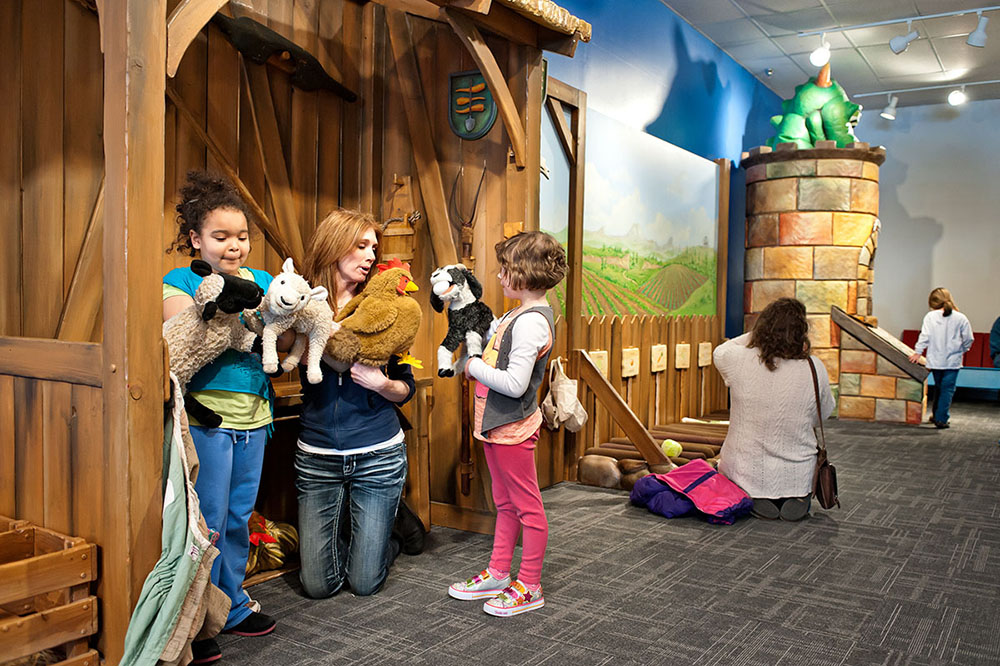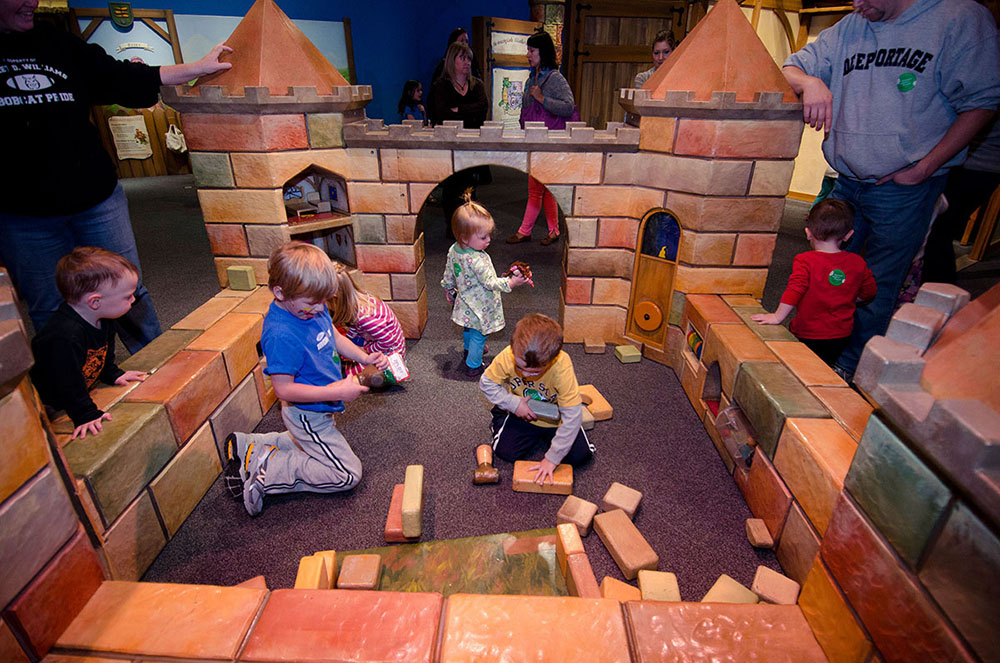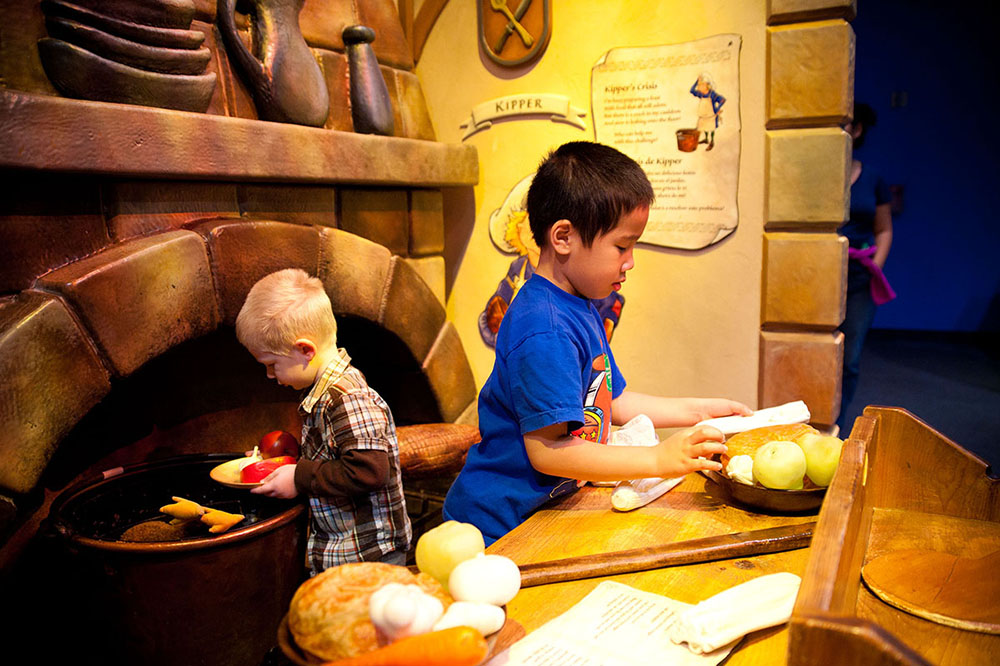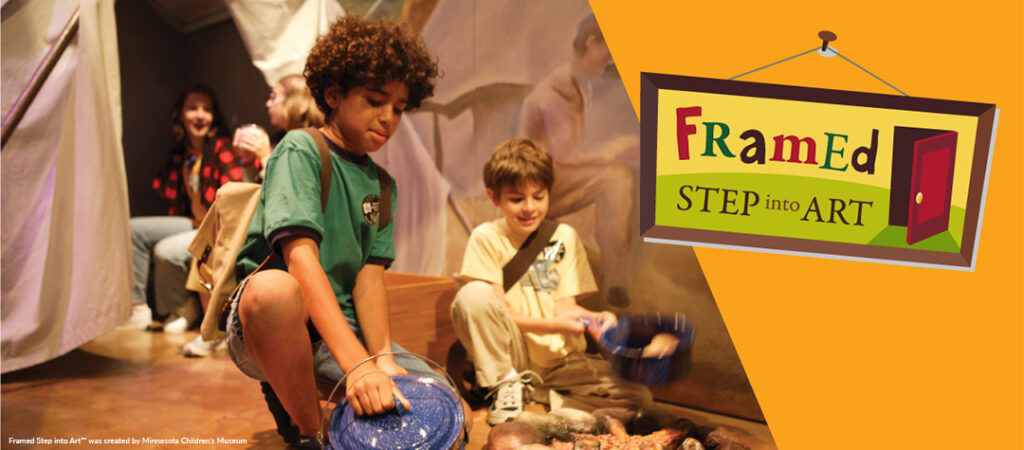Opening September 21, 2024
More details coming soon! (Both exhibits contain bilingual components in English and Spanish.)

Travel back in time to a fanciful, medieval village, filled with opportunities for problem-solving, storytelling and imaginative play. Plant and harvest your own vegetables in the garden while building a chair or making your own design in the carpenters workshop. Use a metal patch to fix a hole in the blacksmith workshop, and dress in costumes and role-play as lords, ladies, and castle villagers.
Exhibit Features:
As visitors explore The Amazing Castle and its eight themed areas, they will encounter graphic panels introducing seven citizens who are part of the castle community. From entertaining to sewing, each citizen has a special duty to do. As they move through the castle, visitors can playfully explore ideas related to community life. Children will experience the interconnectedness of individuals as they interact with friends, family and new acquaintances.
Exhibit Entry and Big Book – From the moment visitors walk through the entrance to The Amazing Castle, they are transported to a magical time and place—and the fantasy begins! “Lord Ben” and “Lady Evolent” welcome children and adults and make sure the castle is a safe and healthy place to live. Visitors can begin their adventure by reading the story of The Amazing Castle, which introduces the castle citizens and depicts the interconnectedness of those living in the castle.
The Keep – The Keep is a fortress sure to be enjoyed by our youngest royals. Toddlers can create a miniature, magical community in a castle-inspired dollhouse, build their own fortress out of “stone” blocks and play with a castle busy wall.
The Great Hall and Garden – Friends and family can take a seat at the royal table while children prepare a wonderful, magical meal with “Kipper the Cook.” They can put on an apron and select ingredients from a larder stocked with bread, vegetables and fruits, and choose a main course! Or, they can put on a garden smock and join “Posey the Gardener” in the royal garden, where visitors can pick and plant vegetables and gather eggs from a hen in the garden shed. To prepare and cook their meal, children can use wooden bowls, cooking utensils and a fireplace complete with a glowing fire, a spit and a cauldron. When the meal is ready, kids can serve their friends and family a heaping helping on wooden plates. Bon appetit!
Royal Puppet Theatre – Children and adults will become castle entertainers when they visit “HiJinx the Jester” in the Royal Puppet Theatre. Visitors present a puppet show using castle character puppets. Children can pick out a fancy robe, pull up a throne and become the Lord or Lady, or don the jester’s costume and entertain the Lord and Lady.
The Royal Workshops – In the Tailor Shop, children and adults can try their hand at repairing and making clothing for all of the castle citizens with “Trim the Tailor.” Visitors play a game and design costumes, from sensible to ridiculous, by mixing and matching puzzle pieces. Children can also create their own outfits and discover how silly their costumes appear when they look at themselves in a distorted mirror!
After visiting the Tailor Shop, children and adults can head over to the Carpenter’s Shop, grab a work apron, and help “Gable the Carpenter” build a simple table or chair using mortise and tenon construction, or put together something of their own design.
After assisting Gable, children can join “Synge the Blacksmith” in the Blacksmith Shop and help her affix a metal patch to the hole in Kipper’s big iron cauldron. Children and adults can also pretend to repair iron tools using a stone forge with “glowing” coals, a water bucket, and Synge’s anvil.
The Dragon Tower – The Dragon Tower is home to “Herald the Dragon,” who announces important information to the citizens of The Amazing Castle. But Herald keeps falling asleep and needs to be awakened frequently. Visitors will love waking Herald, who rises from the top of the tower, by matching each of the six electronic castle character puzzle pieces with his or her appropriate tool or symbol.




Children and adults can enjoy a pretend noontime meal in Grant Wood’s “Dinner for Threshers,” climb into a tent and explore camping gear in John Singer Sargent’s “Camp at Lake O’Hara,” add corn husks to the flower tower in Diego Rivera’s “Corn Festival” and get behind the reins of a giant rooster in an area inspired by Clementine Hunter’s artwork. Visitors can also explore a collection of “Mona Lisa” prints and famous parodies, then step behind a cutout version and replace her famous face with their own.
Exhibit Details
“Dinner for Threshers” by Grant Wood
Enter Grant Wood’s “Dinner for Threshers” and learn about rural life at the turn of the century. Visitors tend to a chicken and eggs, prepare a meal in the kitchen, set the dining table, enjoy a pretend dinner and mix and match the farmers’ patterned shirts.
“Camp at Lake O’Hara” by John Singer Sargent
Visitors travel to the Canadian Rockies in 1916 at John Singer Sargent’s “Camp at Lake O’Hara.” Children climb inside a tent and explore camping gear like Sargent would have used. After cooking a pretend meal over the campfire, kids tell stories around the fire and arrange items in a magnetic frame to show what a painting of today’s campsite might look like.
“Corn Festival” by Diego Rivera
Travel south of the border through this piece from the Court of Fiestas in the Ministry of Education Building in Mexico City. Visitors explore a rendition of one of Rivera’s frescos, add flowers and ribbons of corn husks to the flower tower for a celebration and include their flourish in a mural on a miniature building.
Clementine Hunter
Step inside a world inspired by the artwork of folk art icon Clementine Hunter. Load a cart with zinnia flowers, then climb behind the reins of a giant rooster and take the load to town. Create imaginary creatures like Hunter’s “goosters” by mixing parts from different animals.




